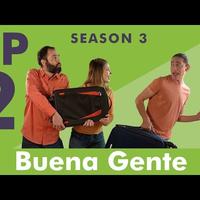Spanish Series Buena Gente S3 E2
Spanische Serie Good People S3 E2
Spanish Series Good People S3 E2
Alejandro quiere llevar muchas cosas.
Alejandro will viele Dinge tragen.
Alejandro wants to carry many things.
No puede ser…
Es kann einfach nicht sein ...
Can not be…
Y son siete días.
Und es sind sieben Tage.
And it's seven days.
Ayúdame a decirle algo.
||to him/her|
Hilf mir, ihm etwas zu sagen.
Help me tell him something.
¿Ok?
Hola.
Hola.
Qué bonita canción.
||song
Was für ein schönes Lied.
What a beautiful song.
Sí, es para mi presentación.
Yes, it is for my presentation.
A mí también me gusta.
Ich mag es auch.
I like it too.
¿Qué tal Gabriel? ¿Cómo estás?
How about Gabriel? How are you?
Hola. Bien, gracias.
Aquí está la maleta pequeña.
Here is the small suitcase.
Para viajar es mejor tener una maleta pequeña.
Zum Reisen ist es besser, einen kleinen Koffer zu haben.
For traveling it is better to have a small suitcase.
¿Cuándo te vas?
Wenn du gehst?
When you leave?
Me voy el jueves.
I leave on Thursday.
Es una maleta pequeña.
No sé.
I dont know.
Solo tienes que llevarte un pasaporte y poca ropa.
Sie müssen nur einen Pass und ein paar Klamotten mitnehmen.
You only have to take a passport and few clothes.
Es lo que le dije yo.
It is what I told him.
Necesito llevar más cosas.
Ich muss mehr Dinge mitbringen.
I need to carry more things.
Pero muchas gracias por la maleta.
But thank you very much for the suitcase.
Voy a ver si caben mi ropa
||||fit||
Ich werde sehen, ob meine Kleidung passt
I'm going to see if my clothes fit
mis cosas de baño
my bathroom stuff
mis cosas para la presentación.
my stuff for presentation.
¿Te vas a Madrid?
Gehst du nach Madrid
Are you going to Madrid?
Hay muchas cosas que hacer y que ver.
Es gibt viele Dinge zu tun und zu sehen.
There are many things to do and see.
Sí, voy a visitar muchos lugares.
|||visit||
Yes, I am going to visit many places.
Quiero caminar por la ciudad.
I want to walk around the city.
Pero solo tengo siete días.
But I only have seven days.
Es lo que te dije, no necesitas llevar muchas cosas.
Es ist das, was ich dir gesagt habe, du musst nicht viele Dinge tragen.
It's what I told you, you don't need to carry many things.
Sé que voy a visitar muchos lugares.
Ich weiß, dass ich viele Orte besuchen werde.
I know I am going to visit many places.
Voy a visitar el Palacio Real.
||||Palace|Royal
I am going to visit the Royal Palace.
El Museo del Prado
|Museum||Meadow
The Prado Museum
y ver las pinturas de Picasso
|||||Picasso
and see the paintings of Picasso
de Velázquez
|Velázquez
de Goya.
|of Goya
from Goya.
Y también voy a comer paella. Mmm.
|||||paella|Hmm
Te va a ir muy bien.
Du wirst es sehr gut machen.
It will go very well.
Esa música está muy fuerte.
That music is very strong.
Sí.
¿Por qué no le dicen que le baje?
|||||||lower
Why don't they tell him to download it?
Lo vamos a hacer. Pero son nuevos vecinos.
Wir werden es tun. Aber sie sind neue Nachbarn.
We are going to do it. But they are new neighbors.
No los conocemos.
Wir kennen sie nicht.
We do not know them.
No sabemos nada de ellos.
|we know|||
Wir wissen nichts über sie.
We do not know anything about them.
No es cierto. Lo que sí sabemos
Es ist nicht wahr. Was wir wissen
It is not true. what we do know
es que les gusta escuchar música muy alto.
is that they like to listen to music very loudly.
¡Qué bonito día!
What a beautiful day!
¿Qué dijo?
What did he say?
“¡Qué bonito día!”
Lo dicen todas las mañanas.
|they say|||
Sie sagen es jeden Morgen.
They say it every morning.
Ah ya...
oh yeah...
Pues sí, es un bonito día.
Yeah, it's a nice day.
Eso es algo que también sabemos.
Das wissen wir auch.
That is something we also know.
Que son muy positivas.
|are||
Y parece que tienen un perro también.
Und anscheinend haben sie auch einen Hund.
Sí…
Y creo que es un perro muy grande.
Mejor voy a cerrar la ventana.
I'd better close the window.
Mmm, ¡qué rico!
Mmm, yummy!
Esas galletas me gustan.
I like those cookies.
¿Son para tu viaje?
Sind sie für Ihre Reise?
Are they for your trip?
Sí. Bueno, toma unas.
Ja. Nun, haben Sie welche.
Yes. Well, have some.
Yo tengo muchas.
I have many.
¿En verdad?
Truly?
Sí, llévatelas.
|take them
Yes, take them.
Y muchas gracias por la maleta.
No hay de qué. Mucha suerte.
Das ist egal. Viel Glück.
It does not matter. Good luck.
Sandra, tu torneo es este fin de semana.
Sandra, your tournament is this weekend.
Sí.
¿Qué posición juegas?
|position|you play
What position do you play?
Soy portera. Y juego muy bien.
|I am a goalkeeper. And I play very well.||||
I am a goalkeeper. And I play very well.
Voy a parar el balón una y otra vez.
I'm going to stop the ball over and over again.
¡A la derecha, a la izquierda, arriba, abajo!
¡Vamos a ganar muchos partidos!
||||matches
We are going to win many games!
Eso espero.
Hoffentlich.
I hope so.
Sí.
Buena suerte.
Gracias.
Gracias.
Adiós.
Que te vaya bien.
Good luck.
Adiós.
Adiós.
¡Oye! No te comas mis galletas.
Hears! Don't eat my cookies.
Son para mi viaje.
Dijiste que tienes muchas.
You said you have many.
Y estoy segura que vas a comprar más.
Und ich bin sicher, Sie werden mehr kaufen.
And I'm sure you will buy more.
Ya, cómete una.
|eat yourself|
Now, eat one.
Bueno. Son muy ricas.
|||tasty
Okay. They are very rich.

